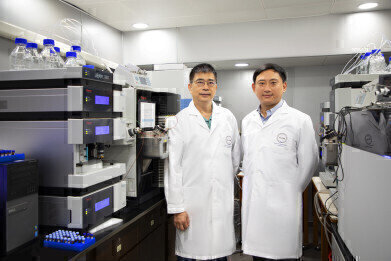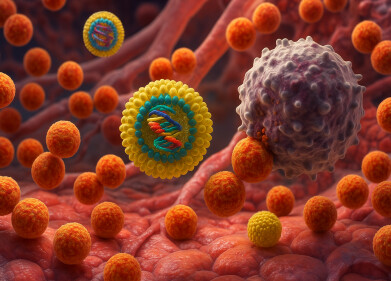-
 Professor Cai Zongwei (left) and Dr Yang Zhu (right).
Professor Cai Zongwei (left) and Dr Yang Zhu (right). -
 Professor Cai Zongwei (left) and Dr Yang Zhu (right).
Professor Cai Zongwei (left) and Dr Yang Zhu (right).
News
Study Identifies Link Between Plasma Metabolites and COVID-19 Antibody Levels in Recovered Patients
Oct 18 2022
Research led by Hong Kong Baptist University (HKBU) has revealed the association between rapidly fading antibody levels in some recovered COVID-19 patients and a high plasma concentration of a metabolite called glycylproline (gly-pro) and its producing enzyme. The research results have been published in the Proceedings of the National Academy of Sciences (PNAS).
The researchers also found that the application of an inhibiting agent can counteract the activities of gly-pro and its producing enzyme, and this helped to maintain COVID-19 antibody levels in a mouse model.
Since the beginning of the pandemic, research studies have revealed changes in plasma cytokine and metabolite levels in COVID-19 patients. Based on these observations, a research team led by Professor Cai Zongwei, Chair Professor of the Department of Chemistry and Director of the State Key Laboratory of Environmental and Biological Analysis, and Dr Yang Zhu, the first author of this paper and a Research Assistant Professor of the Department of Chemistry at HKBU, investigated how plasma cytokines and metabolites are associated with antibody levels in recovered COVID-19 patients.
Overall, the levels of gly-pro in the recovered patient group with rapidly fading antibody levels were four times higher than the control group, while the levels of gly-pro in the recovered patient group with steady COVID-19 antibody levels were two-and-a-half times higher than the control group. Based on these results, the researchers investigated the relationship between COVID-19 antibody levels in recovered patients and gly-pro, as well as the producing enzyme of gly-pro which is named dipeptidyl peptidase-4 (DPP4).
The research team set up a four-week mouse model experiment to test the hypothesis that high gly-pro levels are associated with a rapid drop in COVID-19 antibody levels. The results showed that when the activities of DPP4 are inhibited, the negative effects of gly-pro can be neutralised, and a steady level of COVID-19 antibodies can be maintained.
Professor Cai said: “Effective shield immunity for a community against the spread of COVID-19 is highly dependent on the maintenance of steady antibody levels in individuals. Our experimental results suggest that DPP4 inhibitors can effectively maintain steady antibody levels in COVID-19-infected mice. As a result, our study offers important insights into how we can develop a similar medical approach to maintain COVID-19 antibody levels in humans, which will contribute to the global fight against the pandemic.”
Dr Yang said: “Further studies based on our research findings are warranted to explore the potential in other areas of therapeutic and disease control, especially in terms of other applications. For example, novel strategies may be developed to enhance the efficiency of vaccination in boosting antibody levels in humans, particularly in diabetic patients, a well-known high-risk population for COVID-19.”
Digital Edition
Lab Asia Dec 2025
December 2025
Chromatography Articles- Cutting-edge sample preparation tools help laboratories to stay ahead of the curveMass Spectrometry & Spectroscopy Articles- Unlocking the complexity of metabolomics: Pushi...
View all digital editions
Events
Jan 21 2026 Tokyo, Japan
Jan 28 2026 Tokyo, Japan
Jan 29 2026 New Delhi, India
Feb 07 2026 Boston, MA, USA
Asia Pharma Expo/Asia Lab Expo
Feb 12 2026 Dhaka, Bangladesh


















